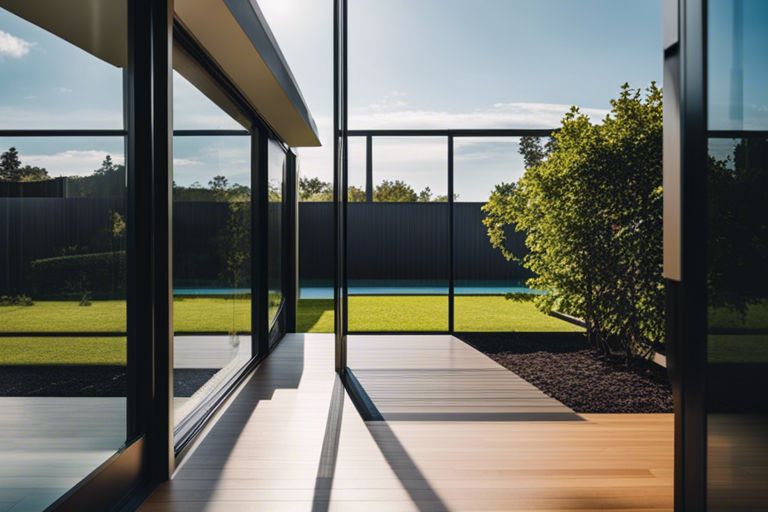Indubitably, when it comes to creating a sustainable and eco-friendly home design, choosing the right aluminium windows and doors is crucial. The right windows and doors can significantly impact your home’s energy efficiency, carbon footprint, and overall environmental contribution. When considering aluminium windows and doors, there are several key factors to keep in mind. Firstly, look for products with high energy efficiency ratings, as this will directly impact your home’s heating and cooling costs. Additionally, consider the recycled content and recyclability of the aluminium used in the products, as this will speak to their overall sustainability. Lastly, opt for windows and doors with durable, long-lasting finishes to minimise the need for replacements and reduce waste. By carefully considering these factors, you can ensure that your choice of aluminium windows and doors aligns with your eco-friendly home design goals.
Key Takeaways:
- Energy efficiency is crucial when choosing aluminium windows and doors for a sustainable home design. Look for products with high thermal performance to minimise heat loss and reduce energy consumption.
- Recycled materials should be a priority when selecting aluminium windows and doors. Opt for products made from recycled aluminium to reduce the environmental impact and promote a circular economy.
- Durable and low-maintenance features are essential for sustainable design. Choose aluminium windows and doors that are built to last, require minimal upkeep, and can be easily recycled at the end of their lifespan.
“`html
Understanding Aluminium Windows and Doors
When it comes to choosing the best windows and doors for your sustainable home design, understanding the properties and benefits of aluminium is crucial. Aluminium is a popular material for windows and doors due to its strength, durability, and versatility. It can be customised to fit any design, making it a popular choice for eco-friendly homes.
Benefits of Aluminium in Construction
Aluminium is a highly desirable material for windows and doors due to its numerous benefits. Firstly, aluminium is lightweight, yet incredibly strong, making it an ideal material for large windows and doors. It is also resistant to corrosion, meaning that you won’t have to worry about rust or deterioration over time. Additionally, aluminium is low maintenance and easy to clean, making it a practical choice for busy homeowners. Furthermore, aluminium is recyclable and sustainable, making it an environmentally friendly option for your home.
Aluminium vs Other Materials
When comparing aluminium to other materials such as uPVC or timber, aluminium comes out on top in many aspects. Unlike uPVC, aluminium windows and doors offer superior strength and durability, ensuring that they will last for many years to come. Additionally, aluminium is more versatile and can be customised to fit any design or architectural style, making it a popular choice for modern and eco-friendly homes. Compared to timber, aluminium requires minimal maintenance and is resistant to warping, swelling, and rotting, making it a more practical option for sustainable home designs.
“`
Factors to Consider when Choosing Aluminium Windows and Doors
When selecting aluminium windows and doors for your sustainable and eco-friendly home design, there are several important factors to consider. Your choices will not only impact the energy efficiency and aesthetic appeal of your home but also its overall environmental impact. Here are some crucial factors to keep in mind when making your decision:
- Energy Efficiency and Insulation
- Durability and Maintenance
- Design and Aesthetic Appeal
- Eco-friendly Manufacturing Processes
Any recommendations you consider for aluminium windows and doors should take these factors into account. For more detailed insights, you can check out this helpful resource: Best Aluminium Doors and Windows: How to Select the …
Energy Efficiency and Insulation
When choosing aluminium windows and doors, it’s crucial to consider their energy efficiency and insulation properties. Look for products that are designed to minimise heat transfer and prevent air leakage. By selecting windows and doors with high-quality insulation, you can reduce your energy consumption and make your home more comfortable throughout the year.
Durability and Maintenance
The durability and maintenance requirements of your aluminium windows and doors are essential considerations. You want products that are built to last and require minimal upkeep. Aluminium is known for its strength and resistance to corrosion, making it a durable choice for your home. Additionally, look for low-maintenance finishes and features that will save you time and effort in the long run.
Design and Aesthetic Appeal
When it comes to the design and aesthetic appeal of your aluminium windows and doors, you want options that complement your overall home design. Consider the style, colour, and hardware options available to ensure that your windows and doors enhance the visual appeal of your home. The design choices you make can also impact the natural light and ventilation within your living spaces.
Eco-friendly Manufacturing Processes
As you focus on creating a sustainable and eco-friendly home, the manufacturing processes of your aluminium windows and doors become critical. Look for products from manufacturers who prioritise environmentally friendly production methods and use recycled materials where possible. By choosing sustainably manufactured windows and doors, you can reduce the environmental footprint of your home.
How-to Tips for Selecting the Right Products
When it comes to choosing aluminium windows and doors for your sustainable and eco-friendly home design, there are several factors to consider. Here are some tips to help you make the right choice:
- Consider the style and design of the aluminium doors to ensure they complement your home’s aesthetic.
- Look for products with high thermal performance ratings to minimise energy loss and reduce your carbon footprint.
- Choose recyclable aluminium and products with environmental certifications to support sustainable manufacturing practices.
- Consider the potential for integration with renewable energy systems to further enhance the energy efficiency of your home.
- Check the warranties and future-proofing options to ensure the longevity and durability of your chosen products.
Assessing Thermal Performance Ratings
When selecting aluminium windows and doors, it’s important to pay attention to their thermal performance ratings. Opt for products that offer excellent insulation to prevent heat loss and maintain a comfortable indoor environment. Look for features such as double or triple glazing and thermal breaks to enhance the energy efficiency of your home.
Checking for Recyclability and Environmental Certifications
For a truly sustainable home design, you should prioritise recyclable aluminium and products that have received environmental certifications. Look for manufacturers that follow responsible sourcing and production practices, and choose products with certifications such as ENERGY STAR or BREEAM to ensure they meet high environmental standards.
Integration with Renewable Energy Systems
Consider how your chosen aluminium windows and doors can integrate with renewable energy systems such as solar panels or geothermal heat pumps. This integration can further enhance the energy efficiency of your home, reduce your reliance on non-renewable energy sources, and lower your overall carbon emissions.
Navigating Warranties and Future-Proofing
Before making a purchase, be sure to thoroughly review the warranties offered by manufacturers and consider the potential for future-proofing your home’s design. Look for products with robust warranties that cover any potential issues, and consider how the design and features of the windows and doors can adapt to future advancements in sustainable technology.

Installation and Best Practices
When it comes to choosing the best aluminium windows and doors for a sustainable and eco-friendly home design, the installation process is just as crucial as the products themselves. Proper installation not only ensures the structural integrity of your windows and doors but also maximises their performance and energy efficiency.
Professional Installation vs DIY
Deciding between professional installation and a DIY approach can be a critical factor in the overall success of your aluminium windows and doors. While DIY may seem like a cost-effective option, it requires a high level of skill and precision to ensure a secure and weather-tight installation. Without proper expertise, you could compromise the efficiency and safety of your windows and doors. Professional installation, on the other hand, ensures that the job is done correctly and efficiently, giving you peace of mind and guaranteeing the best performance from your aluminium windows and doors. It’s crucial to weigh the pros and cons carefully before deciding which route to take.
Maximising Performance through Proper Installation
Proper installation is essential for maximising the performance of your aluminium windows and doors. This includes ensuring a secure fit, proper sealing, and adequate insulation around the frames. An airtight installation is crucial for energy efficiency and preventing drafts. Additionally, following the manufacturer’s guidelines and best practices for installation is vital for maintaining the structural integrity and longevity of your windows and doors. By neglecting these crucial steps, you could risk compromising the energy efficiency, security, and overall performance of your sustainable home design.
Maintenance and Upkeep for Longevity
When it comes to achieving longevity for your aluminium windows and doors, regular maintenance and upkeep are essential. By following a few simple steps, you can ensure that your fixtures remain in top condition, providing optimal performance and energy efficiency for years to come.
Routine Cleaning and Maintenance Tips
Regular cleaning is key to maintaining the appearance and functionality of your aluminium windows and doors. You can use a mild detergent and water to clean the frames, followed by a thorough rinse and dry with a soft cloth. Use a silicone lubricant on the moving parts, such as hinges and handles, to keep them operating smoothly. Inspect the weather stripping for any signs of wear and tear, and replace it if necessary. Additionally, keep the tracks clear of any debris to ensure that the windows and doors open and close without any issues. By incorporating these simple tasks into your regular cleaning routine, you can preserve the integrity of your aluminium fixtures and extend their lifespan.
Upgrades and Replacement Considerations
Over time, it’s important to assess the condition of your aluminium windows and doors and consider any necessary upgrades or replacements. If you notice any significant damage, such as corrosion or discolouration, or if the fixtures are no longer providing adequate insulation, it may be time to consider an upgrade. Similarly, if your windows and doors are outdated and not meeting your energy efficiency requirements, it could be beneficial to explore modern, sustainable options. By investing in high-quality replacements, you can enhance the performance of your home while reducing your environmental impact.

Conclusion
So when it comes to choosing the best aluminium windows and doors for a sustainable and eco-friendly home design, you should consider factors such as energy efficiency, durability, and recyclability. By selecting high-quality aluminium windows and doors, you can reduce your home’s energy consumption, lower your carbon footprint, and contribute to a healthier environment. To learn more about how aluminium doors and windows can enhance sustainability in your home design, visit Aluminium Doors and Windows in Sustainable Building.
FAQ
Q: What are the key factors to consider when choosing aluminium windows and doors for a sustainable and eco-friendly home design?
A: When choosing aluminium windows and doors for a sustainable home design, it’s important to consider the energy efficiency, durability, recyclability, and overall environmental impact of the materials. Look for products with high thermal performance, long lifespan, and a high percentage of recycled content.
Q: How can I ensure that the aluminium windows and doors I choose are energy efficient?
A: To ensure energy efficiency, look for aluminium windows and doors with low U-values and high-quality weather seals to minimize air leakage. Additionally, consider double or triple glazing with low emissivity coatings to improve thermal performance and reduce heat transfer.
Q: Are there any sustainable certifications or standards to look for when selecting aluminium windows and doors?
A: Yes, look for products that are certified by reputable sustainability organisations such as the Forest Stewardship Council (FSC), Green Seal, or ENERGY STAR. These certifications ensure that the products meet rigorous environmental and performance standards.
Q: How can I assess the durability of aluminium windows and doors?
A: Durability can be assessed by examining the manufacturing process, coatings, and hardware. Look for aluminium windows and doors with corrosion-resistant finishes, robust hardware, and a warranty that reflects the product’s expected lifespan.
Q: Is aluminium a sustainable material for windows and doors?
A: Aluminium is a highly sustainable material due to its recyclability and long lifespan. It can be recycled indefinitely without losing its quality, making it an excellent choice for eco-friendly home designs.
Q: What are the advantages of aluminium windows and doors over other materials in terms of sustainability?
A: Aluminium’s lightweight nature and strength allow for slimmer frames, maximising natural light and improving thermal performance. Its durability and low maintenance requirements also contribute to its sustainability, as it reduces the need for replacements and repairs.
Q: How can I ensure that the production of aluminium windows and doors aligns with sustainable practices?
A: Look for suppliers that prioritise sustainable sourcing and ethical manufacturing processes. Consider seeking products from companies that have a transparent supply chain, use renewable energy in production, and employ eco-friendly practices such as waste recycling and water conservation.






